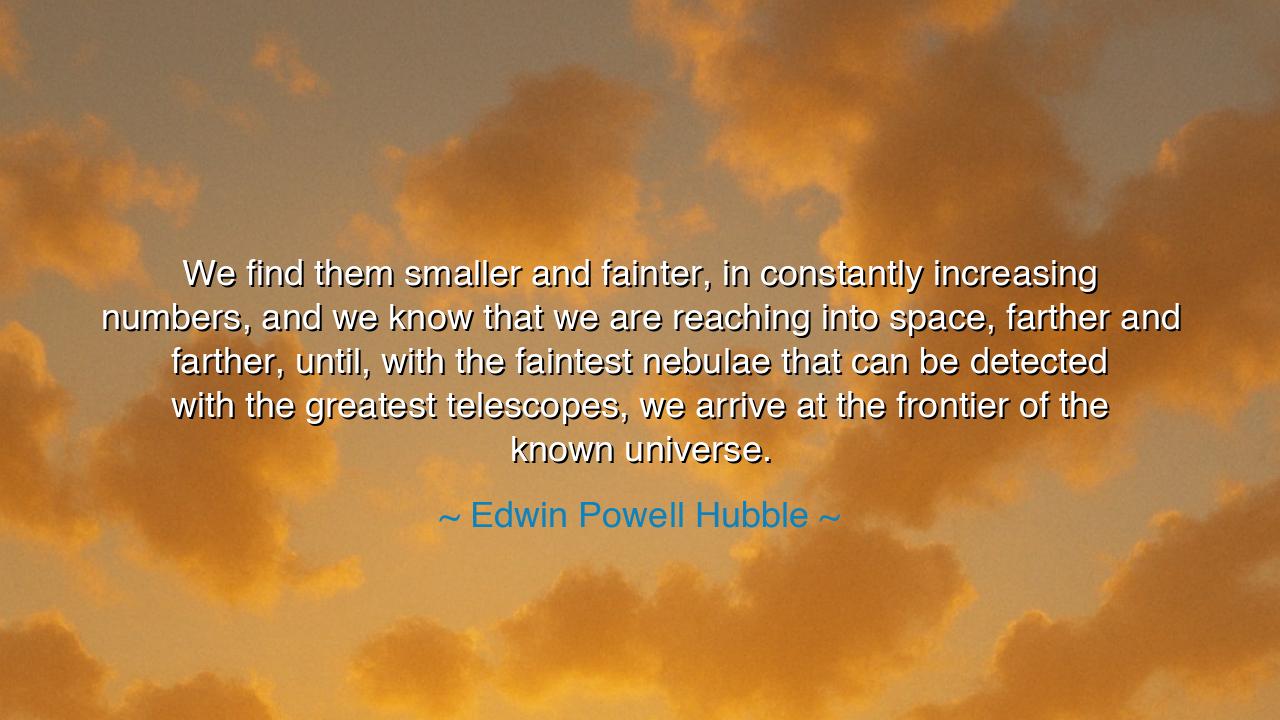
We find them smaller and fainter, in constantly increasing
We find them smaller and fainter, in constantly increasing numbers, and we know that we are reaching into space, farther and farther, until, with the faintest nebulae that can be detected with the greatest telescopes, we arrive at the frontier of the known universe.






Hear the voice of Edwin Powell Hubble, the great seeker of the heavens, who proclaimed with awe and humility: “We find them smaller and fainter, in constantly increasing numbers, and we know that we are reaching into space, farther and farther, until, with the faintest nebulae that can be detected with the greatest telescopes, we arrive at the frontier of the known universe.” These words are not only the testimony of a scientist, but the song of a prophet gazing into the infinite. They reveal the vastness of the cosmos and the courage of the human spirit that dares to stretch its vision beyond the limits of earth.
In Hubble’s time, men still thought the universe was little more than the Milky Way, a single island of stars adrift in the night. But Hubble, with the mighty eye of the Mount Wilson Observatory, pierced deeper. He saw countless galaxies, each one a swarm of suns, each one a kingdom of light. To him, the heavens were not a ceiling, but an open sea, unending and immeasurable. The nebulae, once thought to be mere clouds within our galaxy, revealed themselves as whole universes of their own, and the cosmos became suddenly vast beyond imagination.
This revelation was heroic, for it shattered human pride. For centuries mankind had placed itself at the center of creation, believing the stars to be ornaments for our sky. But Hubble’s discovery cast us into humility. The earth became a speck, the sun a lantern among billions, and man himself but a whisper in the great choir of the universe. Yet far from despairing, Hubble’s words lift us to wonder. To see the smaller and fainter lights is to know that we stand at the edge of infinity, explorers not of oceans but of the very fabric of existence.
History has always honored those who pushed at the frontiers of the known. Just as Columbus sailed beyond the horizon, risking storms to find a world unseen, Hubble’s telescope sailed across the void, revealing realms no eye had ever known. And just as Magellan circled the globe and showed that the world was greater than men had thought, Hubble circled the heavens and revealed that the universe itself was greater than men had dared to dream. His work was a voyage, his instrument a vessel, his spirit the courage of all explorers who choose the unknown over the comfort of certainty.
The meaning of Hubble’s words is not only cosmic, but deeply human. For we too, in our lives, find ourselves looking into the smaller and fainter truths, often overlooked yet countless in number. We too are called to push at the frontiers of our understanding, whether in science, in art, in love, or in the mysteries of the soul. To settle only for what is bright and near is to remain in ignorance; to reach for what is faint and distant is to grow, to expand, to touch the infinite.
The lesson is plain: let us not fear the vastness, nor shrink from the unknown. Instead, let us honor the faint lights, the questions without easy answers, the horizons that call us beyond the safety of our present knowledge. For in pursuing them, we come closer to truth. As Hubble himself showed, the universe is greater than we can imagine, yet it is also open to our seeking, generous to our courage, rewarding to our patience.
Practical actions follow from this wisdom. Seek always to look deeper, whether through the telescope of science or the inward gaze of reflection. Do not ignore what is faint and small, for it may be the key to vast discoveries. Nurture curiosity as a sacred fire, and teach the young that wonder is greater than fear. Honor those who expand our vision, and be ready to expand it yourself, in whatever field of life you touch. For every soul has its own frontier, every mind its own universe to explore.
Thus, let Hubble’s words ring across the ages: with every faint nebula, with every distant light, we are reminded that the journey of discovery has no end. We stand always at the frontier of the known universe, but beyond that frontier lies a greater mystery still. And it is the task of humanity—not to close the book in fear, but to open it wider, page by page, star by star, until we have read as much of the infinite as our spirit dares to seek.






AAdministratorAdministrator
Welcome, honored guests. Please leave a comment, we will respond soon